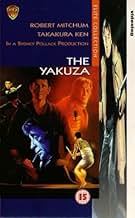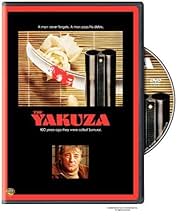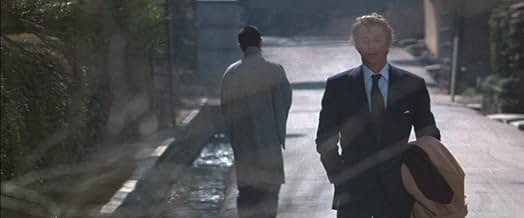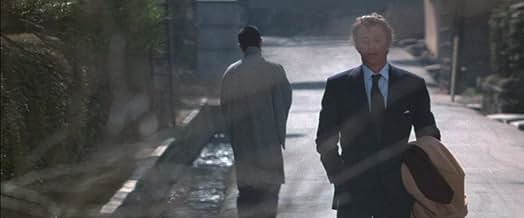American private-eye Harry Kilmer returns to Japan to rescue a friend's kidnapped daughter from the clutches of the Yakuza.American private-eye Harry Kilmer returns to Japan to rescue a friend's kidnapped daughter from the clutches of the Yakuza.American private-eye Harry Kilmer returns to Japan to rescue a friend's kidnapped daughter from the clutches of the Yakuza.
- Director
- Writers
- Stars
Ken Takakura
- Ken Tanaka
- (as Takakura Ken)
Eiji Okada
- Toshiro Tono
- (as Okada Eiji)
Keiko Kishi
- Eiko Tanaka
- (as Kishi Keiko)
Kyôsuke Machida
- Jiro Kato
- (as Kyosuke Machida)
Eiji Gô
- Shiro 'Spider' Tanaka
- (as Go Eiji)
- Director
- Writers
- All cast & crew
- Production, box office & more at IMDbPro
7.211.3K
1
2
3
4
5
6
7
8
9
10
Featured reviews
"I have destroyed his past, and his future"
One of the best West-meets-East films made. Great dialogues, very realistic fighting scenes, even though this film has been made so long ago, without any CGI tricks at all, yet the sword fights still look really great. But in my opinion the story, which may be shortly described with one of the sentences spoken by Harry Kilmer (Robert Mitchum) at the end of this film: "I have destroyed his past, and his future" - perhaps the story is what it makes this film so unique and timeless. Outstanding performance by Ken Takakura ("Ken Tanaka")! If you haven't seen it yet - get it now! And why do I say "get it" instead of "rent it"? Because unfortunately VHS version available in US is more than 10 minutes shorter, and European VHS versions have even more *vital to the plot* cuts! (More info here: http://www.us.imdb.com/title/tt0073918/alternateversions
or if it doesn't work try the link under "Alternate versions"). Please: don't waste your time on those! I swear these edited versions must have been edited either by some blind and deaf personae, or a child who didn't understood plot at all! Currently the only good, somewhat true to the original theatrical print (just slightly more than 3 minutes shorter), are the 2hr long versions available on the not-so-legal (and not too good quality-wise) VCDs released in Hong Kong and Asia.
I rated this film very high - and I am not any big sword-actioneers fan, but nor is this movie any kind of sword fighting flicks. Its just a great story that is told (or actually shown) very well, and it deserves full 10/10.
or if it doesn't work try the link under "Alternate versions"). Please: don't waste your time on those! I swear these edited versions must have been edited either by some blind and deaf personae, or a child who didn't understood plot at all! Currently the only good, somewhat true to the original theatrical print (just slightly more than 3 minutes shorter), are the 2hr long versions available on the not-so-legal (and not too good quality-wise) VCDs released in Hong Kong and Asia.
I rated this film very high - and I am not any big sword-actioneers fan, but nor is this movie any kind of sword fighting flicks. Its just a great story that is told (or actually shown) very well, and it deserves full 10/10.
The Start Of A Great Career
The strongest point of this film is the writing. It's the first Paul Schrader script ever to be filmed, written with his brother Leonard (who also worked with Paul on Blue Collar & Mishima) and Robert Towne (Chinatown, Marathon Man, Bonnie & Clyde). It seems we have the best of both Schrader's here; Leonard really understands the Japanese culture and Paul is a very cerebral and thematic writer who almost always raises a number of interesting issues.
The film, which is very respectful of it's foreign culture and tries to be as true as possible to it, first and foremost shows the differences between American and Japanese culture. However, there are so many themes in this movie though that it becomes tiresome to list them. The key ones include honor, loyalty, burden, duty, friendship, love, loss, obligation, and the differences between the men of pre and post war Japan.
Although Robert Mitchum was approaching 60 when made the film, he still possessed enough of his trademark grace to be credible enough against much younger men in the action scenes. He always exudes so much casualness and weariness, but his work here shows he was obviously fired up by the material.
The other standout actor is Ken Takakura. He plays an honorable man that everyone respects, but his honor and old ways also often make him intolerable to anyone around him. He hides the deep wounds of his character behind his stone face, but that doesn't in any way prevent him from conveys that he's a miserable man from another age who lives by his code but not for anything. As he's the native that used to be in the Yakuza and Mitchum is the gaijin that doesn't have to follow their honor system (although as the movie progresses, he subscribes to their codes and honor system more and more), Takakura gets to do all the skilled swordplay. His fighting won't thrill those who want a lot of stunts, but is great if you enjoy the psychology and strategy of the craft.
The film is it has a drab, low budget kind of look, mainly as a way to maintain the mood and tone of the piece. Some of the scenes really bring the material to life, particularly through some excellent camera work, but sometimes the look is indifferent and the soundtrack seems to be trying too hard. Aside from staying true to the material and getting strong performances, I wouldn't say that Sydney Pollack has done a great job here. This is not the kind of movie you watch if you are looking for John Woo action though, and for the most part the flaws are overshadowed by the strength of the script and performances. 8/10
The film, which is very respectful of it's foreign culture and tries to be as true as possible to it, first and foremost shows the differences between American and Japanese culture. However, there are so many themes in this movie though that it becomes tiresome to list them. The key ones include honor, loyalty, burden, duty, friendship, love, loss, obligation, and the differences between the men of pre and post war Japan.
Although Robert Mitchum was approaching 60 when made the film, he still possessed enough of his trademark grace to be credible enough against much younger men in the action scenes. He always exudes so much casualness and weariness, but his work here shows he was obviously fired up by the material.
The other standout actor is Ken Takakura. He plays an honorable man that everyone respects, but his honor and old ways also often make him intolerable to anyone around him. He hides the deep wounds of his character behind his stone face, but that doesn't in any way prevent him from conveys that he's a miserable man from another age who lives by his code but not for anything. As he's the native that used to be in the Yakuza and Mitchum is the gaijin that doesn't have to follow their honor system (although as the movie progresses, he subscribes to their codes and honor system more and more), Takakura gets to do all the skilled swordplay. His fighting won't thrill those who want a lot of stunts, but is great if you enjoy the psychology and strategy of the craft.
The film is it has a drab, low budget kind of look, mainly as a way to maintain the mood and tone of the piece. Some of the scenes really bring the material to life, particularly through some excellent camera work, but sometimes the look is indifferent and the soundtrack seems to be trying too hard. Aside from staying true to the material and getting strong performances, I wouldn't say that Sydney Pollack has done a great job here. This is not the kind of movie you watch if you are looking for John Woo action though, and for the most part the flaws are overshadowed by the strength of the script and performances. 8/10
widely unrecognized gem
I have to agree with the preponderance of viewers here who rate this as a neglected classic of the 70's. All aspects of the film - performances, script, and direction - raise this to the level of greatness. This is certainly among Mitchum's greatest performances - his subdued, world-weary toughness undergirds the movie. The story as has been noted, is a rich and multilayered one with a sadness that aspires to and quite nearly reaches the level of tragedy. It also must be noted that this is one of the most effective portrayals of Japanese culture on celluloid. The movie does not shrink from violence; the various scenes of assassination and slaughter could have been done by Peckinpah. The movie deserves a restoration and should be brought to tv in letterbox mode. (Are you listening, Turner Classic Movies?)
Blood, Love & Honor
Harry Kilmer is a retired detective whiling away his days at the beach in Malibu. An old friend named George Tanner contacts him with a problem: his daughter has been kidnapped by the Yakuza, with whom Tanner was conducting business. Harry is dispatched to Tokyo to get her back, and while there rekindles his relationship with Eiko, a woman he once loved. For help with his mission, Harry calls upon Eiko's estranged brother Ken, who has an obligation to him- or giri- for coming to Eiko's aid years before. As they battle the Yakuza, Harry comes to realize that Ken and Eiko's relationship is more complicated than he realized, and that he has his own giri he may never be able to repay.
Directed by Sydney Pollack, 'The Yakuza' is a stylish crime drama that entertains, though suffers from tonal and pacing issues galore. Originally written by Paul Schrader, it was intended as a vehicle for Lee Marvin under the direction of Robert Aldrich; though that film was never made. Instead, Pollock was hired to direct and Schrader's original script was considerably altered by Robert Towne. The end result is a film of contrasting styles, attempting- largely in vain- to balance Schrader's hard-edged original material with the romanticism of Pollock and Towne's approach.
Perhaps with Schrader's script in hand, a director like Aldrich- well versed in the art of making action pictures- could have captured the violent sequences in 'The Yakuza' with style and verve. With Towne's, Pollock doesn't, seeming more comfortable with dialogue heavy scenes and wistful set-pieces. More often than not, these feel ponderous and overly-expositional, with too much talking and not enough movement. In contrast, the way Pollock captures the violence seems rushed and cursory.
While we do empathize with the central three characters- Harry, Eiko and Ken- the rest are ill-defined, blurry caricatures one can't help but forget. The film does contain powerful moments, and arrives at a sensational conclusion, but the journey there is one fraught with issues. It is a shame the narrative and Pollock's approach to it is so muddled and uncertain, as there are brilliant sequences in 'The Yakuza'- and it's a triumph in many other respects.
Kôzô Okazaki's cinematography, for one, is exceptional. He shoots the thoroughfares of Tokyo strikingly, in a manner which heightens the city's neon-streaked coldness. Watching Harry somberly stalk the city's side-streets or graveyards is arresting, while the intricate lighting in interior shots captures one's attention and keeps it held. Dave Grusin's jazzy score is also worth mentioning, as it lends to proceedings an ambience of film-noir that feels most appropriate and atmospheric.
'The Yakuza' also boasts impressive performances from the cast that one would be remiss not to mention. Robert Mitchum stars as Harry, delivering one of the finest performances from the latter half of his career. Arguably one of the most naturalistic actors of all time, he never resorted to theatrics or seemed anything less than fully authentic. His performance here as Harry is thoughtful, powerfully understated and proof that less really does mean more when it comes to acting. How the Academy never recognized his greatness is frankly scandalous; as whether in 'The Yakuza' or anything else, Mitchum was always perfect.
His co-star Ken Takakura subscribes to the same playbook as he does, delivering a restrained, masterful performance of great subtlety and style. Starring as Ken, Takakura has a magnetic screen presence and an enigmatic gravitas; ensuring you'll be staring his way anytime he's on screen. Richard Jordan also does strong work as an associate of Harry's named Dusty, and Keiko Kishi is utterly beguiling as Eiko; sharing with Mitchum a very warm, seemingly authentic chemistry.
Sydney Pollock's 'The Yakuza' is an entertaining film, though it may have been better in the hands of a different director. While it has tonal issues and the dialogue is a little stilted in places, the cinematography from Kôzô Okazaki is captivating, and Dave Grusin's score is atmospheric. The performances are routinely brilliant too, with Mitchum and Ken Takakura doing especially fine work. Taking all that into account, while the saga of blood, love and honor that is 'The Yakuza' is well worth seeing; it is not a masterpiece.
Directed by Sydney Pollack, 'The Yakuza' is a stylish crime drama that entertains, though suffers from tonal and pacing issues galore. Originally written by Paul Schrader, it was intended as a vehicle for Lee Marvin under the direction of Robert Aldrich; though that film was never made. Instead, Pollock was hired to direct and Schrader's original script was considerably altered by Robert Towne. The end result is a film of contrasting styles, attempting- largely in vain- to balance Schrader's hard-edged original material with the romanticism of Pollock and Towne's approach.
Perhaps with Schrader's script in hand, a director like Aldrich- well versed in the art of making action pictures- could have captured the violent sequences in 'The Yakuza' with style and verve. With Towne's, Pollock doesn't, seeming more comfortable with dialogue heavy scenes and wistful set-pieces. More often than not, these feel ponderous and overly-expositional, with too much talking and not enough movement. In contrast, the way Pollock captures the violence seems rushed and cursory.
While we do empathize with the central three characters- Harry, Eiko and Ken- the rest are ill-defined, blurry caricatures one can't help but forget. The film does contain powerful moments, and arrives at a sensational conclusion, but the journey there is one fraught with issues. It is a shame the narrative and Pollock's approach to it is so muddled and uncertain, as there are brilliant sequences in 'The Yakuza'- and it's a triumph in many other respects.
Kôzô Okazaki's cinematography, for one, is exceptional. He shoots the thoroughfares of Tokyo strikingly, in a manner which heightens the city's neon-streaked coldness. Watching Harry somberly stalk the city's side-streets or graveyards is arresting, while the intricate lighting in interior shots captures one's attention and keeps it held. Dave Grusin's jazzy score is also worth mentioning, as it lends to proceedings an ambience of film-noir that feels most appropriate and atmospheric.
'The Yakuza' also boasts impressive performances from the cast that one would be remiss not to mention. Robert Mitchum stars as Harry, delivering one of the finest performances from the latter half of his career. Arguably one of the most naturalistic actors of all time, he never resorted to theatrics or seemed anything less than fully authentic. His performance here as Harry is thoughtful, powerfully understated and proof that less really does mean more when it comes to acting. How the Academy never recognized his greatness is frankly scandalous; as whether in 'The Yakuza' or anything else, Mitchum was always perfect.
His co-star Ken Takakura subscribes to the same playbook as he does, delivering a restrained, masterful performance of great subtlety and style. Starring as Ken, Takakura has a magnetic screen presence and an enigmatic gravitas; ensuring you'll be staring his way anytime he's on screen. Richard Jordan also does strong work as an associate of Harry's named Dusty, and Keiko Kishi is utterly beguiling as Eiko; sharing with Mitchum a very warm, seemingly authentic chemistry.
Sydney Pollock's 'The Yakuza' is an entertaining film, though it may have been better in the hands of a different director. While it has tonal issues and the dialogue is a little stilted in places, the cinematography from Kôzô Okazaki is captivating, and Dave Grusin's score is atmospheric. The performances are routinely brilliant too, with Mitchum and Ken Takakura doing especially fine work. Taking all that into account, while the saga of blood, love and honor that is 'The Yakuza' is well worth seeing; it is not a masterpiece.
A must see for Japanophiles
Not only is this a good 70's gangster/action flick, it is also one of the few movies about Japan ever produced in the States that does not make too many mistakes about Japanese culture.
Ken Takakura puts in a great performance which is no surprise since he first became famous in Japan for acting in yakuza (gangster) movies.
Anyone who has ever tried to understand or explain the concept of "giri" should see this movie!
Ken Takakura puts in a great performance which is no surprise since he first became famous in Japan for acting in yakuza (gangster) movies.
Anyone who has ever tried to understand or explain the concept of "giri" should see this movie!
Did you know
- TriviaMartin Scorsese wanted to direct after Mean Streets (1973), but the producers wanted Sydney Pollack. Scorsese is on record that he would very much have liked to direct the film and was disappointed that he was passed over. However, he got to direct Alice Doesn't Live Here Anymore (1974) instead after being sought out by Ellen Burstyn. "Alice" ended up making more than 20 times its budget and won Burstyn an academy award, while this film became a box office bomb.
- GoofsThe plane that Kilmer is boarding at the end is a Boeing 707; the one shown taking off in the last scene is a 727.
- Alternate versionsFor the Spanish Castilian version all the dialogues were dubbed to Spanish, even the Japanese lines.
- ConnectionsFeatured in ...Promises to Keep (1974)
- How long is The Yakuza?Powered by Alexa
Details
Box office
- Budget
- $5,000,000 (estimated)
- Runtime
- 1h 52m(112 min)
- Sound mix
- Aspect ratio
- 2.39 : 1
Contribute to this page
Suggest an edit or add missing content


































